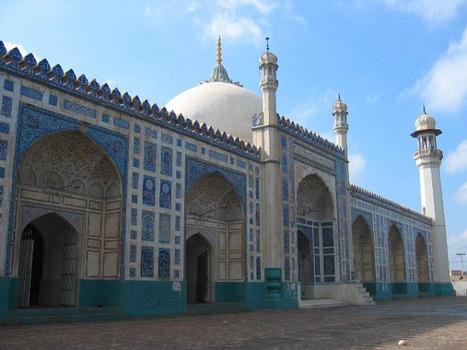General Information
| Other name(s): | Shahi Masjid |
|---|---|
| Completion: | 1735 |
| Status: | in use |
Project Type
| Function / usage: |
Mosque |
|---|---|
| Structure: |
Dome |
| Material: |
Masonry structure |
| Architectural style: |
Indo-Islamic |
Location
Technical Information
There currently is no technical data available.
Excerpt from Wikipedia
The Shahi Eid Gah (Urdu: شاہی عید گاہ مسجد) is an early 18th-century mosque located in Multan, southern Punjab.
Location
Located on the main Multan-Lahore highway in the Northeast of the oldest part of the city. The mosque is adjacent to the 20th century Sufi shrine of Ahmad Saeed Kazmi.
History
Founding
The mosque was built in 1735 CE during the reign of Mughal Emperor Muhammad Shah. The mosque was funded by Nawab Abdul Samad Khan, who was the Mughal governor of Multan.
British
The mosque was used as a court during the early British period in Multan. It was restored and returned to its original purpose in 1891 at the insistence of Deputy Commissioner H.C. Cookson.
Modern
After the independence of Pakistan, the courtyard was expanded to accommodate more worshippers.
Architecture
The mosque is spacious, with a vast courtyard and a prayer chamber measuring 250 feet by 54 feet, and features seven domes.
The mosque's exterior is embellished with glazed blue Multan-style tiles, while the interior is ornamented with intricate mosaics.
Text imported from Wikipedia article "Shahi Eid Gah Mosque" and modified on December 27, 2024 according to the CC-BY-SA 4.0 International license.
Participants
Currently there is no information available about persons or companies having participated in this project.
Relevant Web Sites
- About this
data sheet - Structure-ID
20040049 - Published on:
20/10/2008 - Last updated on:
28/05/2021





